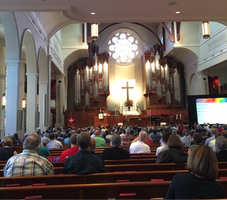 A not so empty sanctuary of pastors being filled again by the Holy Spirit....
A not so empty sanctuary of pastors being filled again by the Holy Spirit.... My husband and I got engaged in October 2014, and I’ve been trying to catch my breath ever since. It’s mostly good things that keep us on the go and without much down-time; but I realize it has left me tired and feeling empty in other ways. I wasn't really sure what to expect at The Festival of Homiletics, yet I also had no idea how life-giving it would be!
It was a place to find respite and Sabbath. Others had planned worship for us. We, who are used to creating every experience, we pastors are resting in God's presence. I drank in the thoughtful lectures and musical offerings like a toddler drinking Kool-Aid on a hot summer day… so thirsty they forget to breathe until someone forces the sippy cup away from their mouth.
Anna Carter Florence, Professor of Preaching at Columbia Theological Seminary, preached at our first worship service, and followed with a lecture on Tuesday entitled Five Things Poetry Can Do For Prophetic Preaching. I’d be lying if I said I loved poetry, but I’ve wanted to love it for a long time. My brain often operates too literally to grasp some of the imagery, and more often than not my brain is attempting to “tie the poem to a chair with a rope/ and torture a confession out of it. / ....then begin beating it with a hose / to find out what it really means.” (Billy Collins, Introduction to Poetry)
I voraciously took notes– that may or may not make sense in the future– as I continued to struggle with poetry that I know can be life-giving. Those notes might make sense and be fulfilling in days ahead, but toward the end of the lecture is when I received the best gift that a busy, sometimes empty-feeling, pastor can receive. She reminded me that no matter how confused I am about feeling "empty" in the midst of fantastic celebrations, poetry recognizes my emptiness. My emptiness that is somehow also filled with such wonderful experiences is not without its merit, and nothing of which to be ashamed.
The poet, and the poem, recognize our emptiness. “When we no longer know which way to go is when we start our real journey,” Dr. Florence says.
Emptiness is the signal that you have come to the real work. Emptiness is normal and necessary; it is the door that leads to the next thing. Its purpose is to launch us into the next mystery.
I recognize that my life is finally slowing down. After 18 months of go, go, go, my life has come to a rhythm and starting to give me more time for my own sabbath. Even still, ANY emptiness for a pastor feels like failure. How can an even-only-temporary empty-feeling pastor lead the flock toward fulfillment in God’s presence? Furthermore, how can a struggling Church lead others toward fulfillment in God’s presence? How can the Body of Christ that The Pew Research Center continually reminds us is dying and has empty pews, share the light of Christ with the world? How can a Church that is constantly being told it is empty, feel inspired to live into the fullness of life God intended? I ask this question, not of OPCC, but of the capital-C Church, the whole Church, the whole set of followers of Christ?
Though it has been AMAZING, my world won’t change dramatically now having returned from the Festival of Homiletics, and the Church is not going to change dramatically when these 1200 preachers find new inspiration for our sermons in the coming weeks. Perhaps, though, we will sit more comfortably with our occasional emptiness because we know it is not the enemy.
Anna Carter Florence reminded us that inspiration is born of genuine emptiness; and the mind that is not baffled into blankness, is not employed. So perhaps we - the big C group - are not a shrinking Church. Rather, we are a Church cleaning out the clutter that prevents us from seeing that we’re ready for new life.
Poetry reminds pastors and people of faith: keep trying, and keep embracing the occasional emptiness. Because the empty tomb is what always has and will continue to lead to life-giving beauty.

 RSS Feed
RSS Feed



